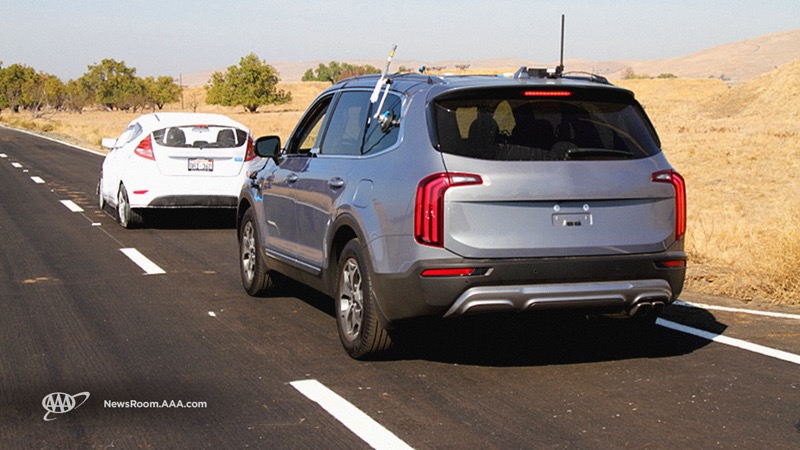AAA recently tested advanced driver-assistance systems built in into vehicles by the manufacturer. They specifically looked at how the sensors would work when affected by bugs, road debris or heavy rainfall. Forward-facing collision systems were the focus of the study, along with other systems that use a visual and audible alert to tell the driver to brake. Generally, the systems will work in less-than-perfect conditions, but a little cleaning of the windshield makes them perform substantially better. What a terrific excuse to get your car detailed. After all, we are talking about safety.
AAA Findings
 The AAA findings illustrate that environmental conditions such as rainfall and, to a lesser extent, ADAS cameras obstructed by a dirty windshield can have an adverse effect on lane-keeping assistance and automatic emergency braking systems. To simulate rainfall, AAA devised a system to spray the front windshield where the camera was mounted.
The AAA findings illustrate that environmental conditions such as rainfall and, to a lesser extent, ADAS cameras obstructed by a dirty windshield can have an adverse effect on lane-keeping assistance and automatic emergency braking systems. To simulate rainfall, AAA devised a system to spray the front windshield where the camera was mounted.
According to AAA, it is important to note that within this work, the simulated rainfall and occluded cameras represent moderate conditions, and the research didn’t evaluate all potential degradation scenarios. Depending on driving environments and vehicle maintenance habits, the severity of rainfall and camera occlusion simulated in this work will not approach conditions encountered in the real world. In other words, lane-keeping assistance and automatic emergency braking systems may be influenced to a greater extent in more severe conditions than were seen in this standardized testing.
Although intense rainfall can’t be controlled on a road trip, a driver can easily clean the windshield and sensors of dirt, bugs and debris. But the takeaway is that drivers must be especially attentive when road conditions turn ugly.
Drive to Road Conditions
Drivers must exercise additional caution when using lane-keeping assistance and automatic emergency braking systems in inclement weather because performance may be adversely affected. Additionally, extra stopping distance may be required depending on rainfall intensity, speed and the vehicle’s condition.
But the results are clear. AAA notes, “In total, lane-keeping assistance and automatic emergency braking systems can significantly enhance safety when utilized properly. Drivers must understand system limitations in adverse conditions and regularly clean areas around sensors to ensure optimal performance.”
Using ADAS as Another Tool in the Safety Toolbox
 AAA found that, in general, simulated rainfall did have an impact on the effectiveness of lane-keeping assistance and automatic emergency braking systems. For lane-keeping assistance systems, 69 percent of test runs conducted with simulated rainfall resulted in the test vehicle crossing a lane marker on the road. For braking tests, AAA set up an inflatable dummy vehicle in front of the test vehicle. Overall, 17 percent of test runs conducted with simulated rainfall resulted in a collision for test speeds of 25 mph. That still correlates to an 83% ADAS success rate.
AAA found that, in general, simulated rainfall did have an impact on the effectiveness of lane-keeping assistance and automatic emergency braking systems. For lane-keeping assistance systems, 69 percent of test runs conducted with simulated rainfall resulted in the test vehicle crossing a lane marker on the road. For braking tests, AAA set up an inflatable dummy vehicle in front of the test vehicle. Overall, 17 percent of test runs conducted with simulated rainfall resulted in a collision for test speeds of 25 mph. That still correlates to an 83% ADAS success rate.
Additionally, regarding aftermarket versus OEM sensors, OEMs are typically shopping for the least expensive sensor from a supplier to do the job. The aftermarket has a range of products at different price points. Some aftermarket companies are proud of the level of quality in their sensors. Choosing quality components and an installation done by a knowledgeable VZAN-certified technician may lead to even better results.
Keep It Safe
The AAA study concluded that drivers must use extra caution and avoid overreliance on driver assistance alerts in adverse weather conditions. For optimal system performance, areas around cameras and radar sensors should be kept clean. But the clear result is that when used properly, advanced driver-assistance systems greatly reduce the risk of an accident.
Don’t let the need for increased vigilance in rainy conditions deter you from an ADAS purchase. Properly installed, ADAS can help reduce the risk of accidents while protecting your property and loved ones.


